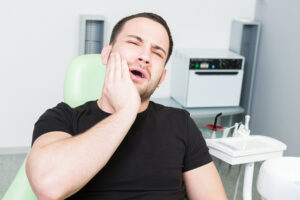 Experiencing a dental injury can be a traumatic experience. If you experience an impact injury to your mouth, you may need root canal treatment, even if the tooth isn’t completely knocked out of your mouth. The pulp of your tooth can be injured if the tooth is pushed into or out of its socket, or if it is forced to one side because of the injury.
Experiencing a dental injury can be a traumatic experience. If you experience an impact injury to your mouth, you may need root canal treatment, even if the tooth isn’t completely knocked out of your mouth. The pulp of your tooth can be injured if the tooth is pushed into or out of its socket, or if it is forced to one side because of the injury.
Here are some common questions and answers about what you should do if you have a dislodged tooth.
Frequently Asked Questions About Dislodged Teeth
Question #1: Ouch! I have a tooth dislodged from an accident. What should I do?
You should contact your endodontist or general dentist to have him or her reposition and stabilize the tooth. Medication such as calcium hydroxide may be put inside the tooth as part of the root canal treatment.
Question #2: Why do I need to see an endodontist about my dislodged tooth?
As mentioned above, an injury severe enough to move a tooth out of its natural place in your mouth is likely to cause damage to the pulp and root of your tooth. Endodontists are experts in providing root canal treatments, which are essential to saving an injured or infected tooth that has damage to its pulp.
Question #3: How soon should root canal treatment be started on a dislodged tooth?
To ensure the best chance for success, root canal treatment on a dislodged tooth should be started within a few days of the injury, whenever possible.
Question #4: My 11-year-old had one of her permanent teeth dislodged. Does she need a root canal treatment?
Maybe. The teeth of children under age 12 are still developing and may be able to recover from an injury in ways that the teeth of an adult cannot. Your endodontist or general dentist should monitor your child’s tooth closely so that he or she can intervene immediately if any unfavorable changes appear.
“Having a tooth dislodged can be scary, and can also really hurt,” says Dr. Jacqueline S. Allen, who practices with the Phoenix Endodontic Group. “It can be reassuring to know that a root canal treatment can help preserve the natural tooth and keep it healthy for years to come!”
